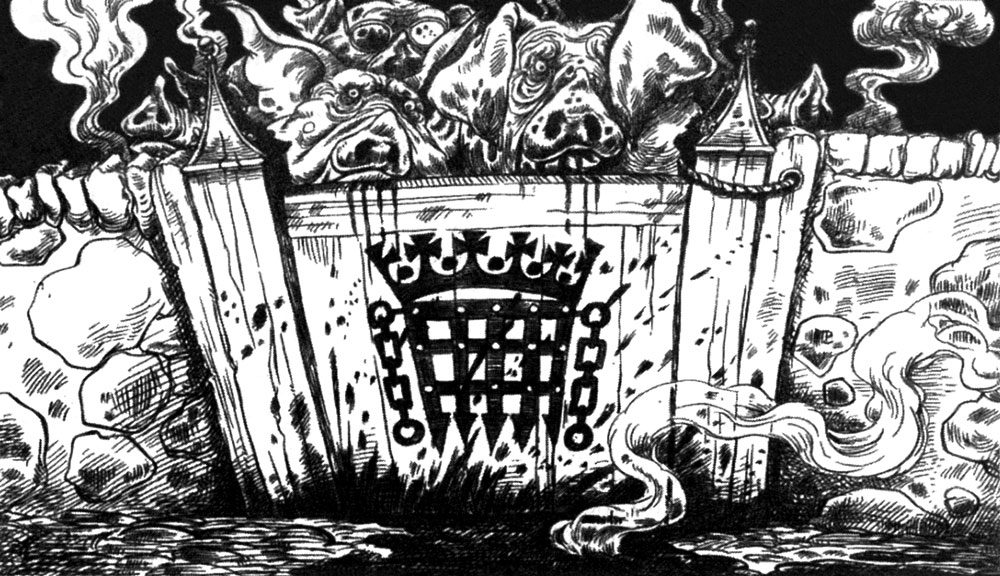
Actors Of Parliament
Squall 10, Summer 1995, pg. 11.
Until recently, Graham Bright (Con MP - Luton South) seemed to have a sure footing on the giddy political career ladder as parliamentary private secretary to the Prime Minister, John Major, a job he had held since 1990.
In 1994 he was one of the MPs named as contributing the least to parliamentary debates but as far as free festivals and parties went, he had already done his damage.
In 1990, the same year as he got the job as PPS to the Prime Minister, Bright authored a private members bill - the Entertainments (Increased Penalties) Act which reached the statute books during that parliamentary year, leading to heavy fines and imprisonment for organisers of unlicensed raves. Free and unlicensed parties reeled from the hammer-blow and an emerging communal phenomenon was forced to look elsewhere for its collective ecstasy.
The upshot was that people with the need to dance were identified by more commercially orientated rave organisers, who secured licences with their capital and then cashed in on the new culture with the kind of extortionate entrance fees that have since come to be taken for granted.
Since that time, up to 26 people have died in commercial rave clubs, with dehydration as one of the primary causes of death. To swell the profits made from raves even further, water taps are often turned off to maximise water sales at the bar, and the clubs are packed to increase the takings on the door, raising both the temperature and the potential for fatalities. A problem not encountered when dancing in open spaces.
It is no small irony - and perhaps not even coincidence - that Graham Bright is one of the Exodus Collective’s local MPs up in Luton. In May this year, members of the Collective sought and obtained a meeting with Graham Bright at his constituency office. Bright thought they had come to talk about a community centre the Collective intend to open in central Luton, but they had in fact come for other reasons.
It just so happens that Whitbread breweries have their headquarters in Graham Bright’s Luton constituency and are a powerful force in local politics. Indeed, Samuel Whitbread is the Lord Lieutenant of Bedfordshire.
When Exodus ran its new year rave at the end of 1993, 10,000 people attended. The pubs of Luton were empty and even the local police commented on the decrease in alcohol-related crime in the area on that night and indeed on their rave nights in general. Truth is of course that raves and alcohol don’t mix much and thus Whitbread must surely have viewed the burgeoning rave culture as very threatening to its sales.
Exodus asked Graham Bright whether or not he knew that 26 people had died in legal licence, commercial night clubs - the places he had described as safe when pushing his Bill through.
He replied that he didn’t know anything about it and that he had not come to talk about a piece of legislation he was involved in four years ago. Bright told Exodus that all the documents relating which organisations he had consulted with during the passage of his private members bill had been lost.
Exodus then asked him whether he knew Ian Greer, of professional parliamentary lobbyists Ian Greer Associates. Bright replied that he knew of him. Exodus then asked him if Whitbread, a major client of Ian Greer, had lobbied him in connection with introducing the Entertainments (Increase Penalty) Act.
At mention of this, Graham Bright stood up and slammed his desk with both fists demanding that the Exodus Collective members get out of his office. One of the Collective intimated to Bright that they had just recorded the conversation, at which point Bright asked them to sit down, saying wanted to know about the 26 deaths in commercial rave clubs.
“We chipped and left him flapping,” commented an Exodus Collective spokesperson afterwards.
An exchange of letters since that time has led to an assurance from Graham Bright that he would look into the 26 commercial rave club deaths.
As for the lobbying on behalf of Whitbread, it is difficult to know whether a profit-motivated involvement in hammering free parties will ever be fully exposed. Further letters from Exodus to Bright have produced replies but each time the question over Whitbread’s involvement has been ignored. Graham Bright on the other hand was removed as PPS to John Major, given a knighthood and then shovelled to the rather more backwater job as one of the Vice-Chairmen of the Conservative party.
Odd that really, because his sidelining occurred roughly six months before the cash for questions, MPs and lobbying scandal broke in the media, with Sir Graham Bright’s name implicated in a series of scandals that also involved Ian Greer Associates.
“Who spiked the dance floor? - we reckon he did,” says an Exodus spokesperson.
Related Articles
Ex-Actors Of Parliament - Shed no tears - it’s yer Squall political graveyard, including Tory ex-MP Graham Bright amongst others - Squall 15, Summer 1997
Actors of Parliament - the latest gobble from Westminster - Squall 9 - Jan/Feb 1995.
To see Squall's full coverage of Exodus click here
